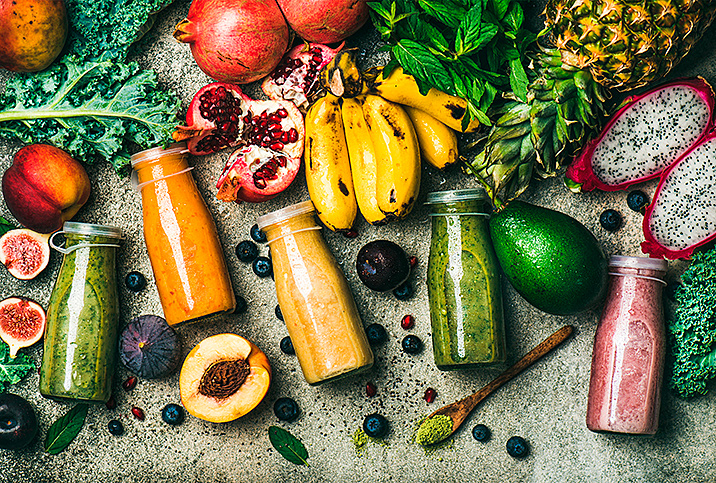Superfoods: When Your Grub Gets a Power-Up

The terms "superfood" and "good for you" are thrown around all the time, especially in diet culture. But there's more to those umbrella terms—and to the foods themselves.
Social media and the internet, in general, have become the sources the majority of us look to for advice, but there's so much misinformation, incomplete information and downright fake news out there about nutrition, diet, exercise and more.
It can be dangerous to believe everything you read online, especially when there's an overuse of buzzwords like "superfood."
What does 'superfood' mean, anyway?
According to Heather Hanks, a nutritionist specializing in holistic nutrition, gut health and chronic disease, superfoods contain a higher amount of nutrients than other foods, and can include a wider profile of vitamins, minerals, antioxidants, healthy fats, fiber or protein.
There is no official definition for the term, particularly not in medical literature. The concept is similar to "organic" versus "natural." Organic foods are regulated by the USDA and have to be certified organic. Whereas, natural is not a regulated term and any food labeled as such doesn't necessarily meet any qualifications.
As Keith-Thomas Ayoob, Ed.D., R.D., FAND, described it, a true health claim on a food label is difficult to get and requires a lot of government oversight, approval and specific language.
"'Superfoods' is a colloquial term, and there is no [agreed-upon] definition internationally, which has been increasingly used to describe foods that are considered to have multiple health benefits due to its nutritional content," said Pamela Suarez, a food chemist and specialist in the management of food, nutrition and health systems. "Before this, the term 'functional foods' was also used to describe similar types of food."
'Superfoods aren't necessarily healthier than regular foods.'
The word "superfood" is also very subjective. Andrea Paul, M.D., a medical advisor, said a "regular" food, such as avocado, can contain just as many nutrients as a "superfood," such as kale.
"Superfoods aren't necessarily healthier than regular foods," Paul continued. "Especially for health-conscious consumers on a budget, purchasing more easily accessible foods like lettuce and tomatoes may be more economical and can be just as healthy as buying superfoods."
The phrase "good for you" is also subjective and encompasses superfoods, among others. Superfoods are generally labeled as "good for you," but they're not the only foods marketed with those words.
"I hear this a lot, and there is a big misconception when it comes to foods that are 'good for you.' It seems to be generational, too. [For example,] 'Soup is good for you.' This may or may not be true," Hanks said. "I think it's also important to note that not everyone has the same reaction to foods. Some people cannot tolerate grains, while others are okay with it. The key is to find foods that are inflammatory to you and eliminate those from your diet."
How to know what's healthy and what's not
"There is no food product that's healthy and safe for everyone, due to individual biochemistry. Even an innocuous food like broccoli could cause an allergy in a patient," Paul said. "Generally, foods are considered 'good for you' if they're nutritionally dense and lack any studied toxicity or negative effects."
Ayoob said broccoli has been referred to as a superfood, but all vegetables have their own benefits. Ayoob's concern as a practitioner is people thinking superfoods are the only ones worth eating, which runs the risk of people avoiding any fruits and vegetables, oils, yogurts, and such that are not labeled a "superfood."
Paul recommends patients work with their doctor or nutritionist to build a diet right for them. Eating minimally processed and high-nutrient foods that don't cause personal side effects is a good guideline for the general public. This is especially true when the blanket terms of "superfood" and "good for you" aren't always based on fact and may just be part of a marketing campaign.
"Because there's so much money in the food industry, there are a lot of confusing marketing claims, which is unfortunate because it makes nutrition more opaque to the average consumer," Paul explained.
Public policies started targeting the junk food category as bad or unhealthy, so companies with certain types of products are always trying to differentiate from that category, Suarez noted.
There's also a general notion out there that eating superfoods or foods labeled as "good for you" will help you lose weight, but there are so many other factors involved in losing weight that it's misleading to advertise a certain food as being solely responsible for weight loss.
What to know about healthy food culture
Paul knows it's a good thing when more consumers seek out healthy options, but it bothers her when companies make false or overexaggerated marketing claims that aren't based on any hard science.
"I want people to focus on their diet and eating style, not one specific food or another," Ayoob said. "If you load up your plate with fruits, veggies, whole grains and lean protein, plus add a dairy food a few times a day, you probably have a super diet or at least a diet that's more balanced than most people's."
Ayoob noted, though, that the concept of "clean eating" fosters a huge fear of food.
"It's unnecessary, not based on credible science, usually a marketing gimmick, and just another arbitrary fad term with no legal definition that serves to scare people," Ayoob added.
Suarez said, as a food scientist, she tends to see food content very objectively and specific foods just as components of a whole diet.
"I do not think it's helpful to start adding these types of adjectives to food, and we would benefit more if we can see them with neutral eyes so we can better decide and design our diets," Suarez said.




















